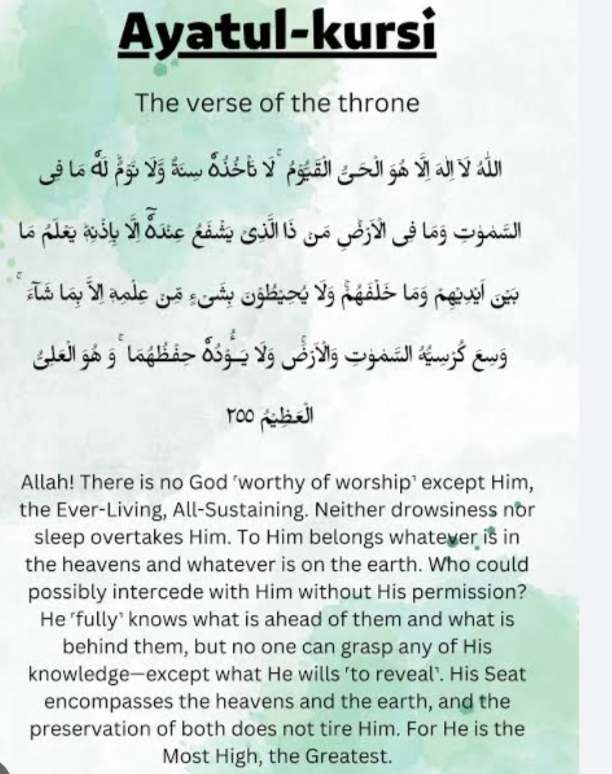Ayatul Kursi: The Throne Verse in Islam
Ayatul Kursi, also known as the Verse of the Throne, is considered one of the most important and sacred verses in the Holy Quran used by Muslims all over the world. This holy verse forms part of Surah Al-Baqarah, Chapter 2, Verse 255, which encompasses within it the very essence of Islamic beliefs and eternal spiritual motivation and direction.

Text of Ayatul Kursi:
In depth, meaning, and significance, it requires having in the first place the text of Ayatul Kursi in Arabic and its Romanization.
Arabic :
اللَّهُ لَا إِلَٰهَ إِلَّا هُوَ الْحَيُّ الْقَيُّومُ ۚ لَا تَأْخُذُهُ سِنَةٌ وَلَا نَوْمٌ ۚ لَّهُ مَا فِي السَّمَاوَاتِ وَمَا فِي الْأَرْضِ ۗ مَن ذَا الَّذِي يَشْفَعُ عِندَهُ إِلَّا بِإِذْنِهِ ۚ يَعْلَمُ مَا بَيْنَ أَيْدِيهِمْ وَمَا خَلْفَهُمْ ۖ وَلَا يُحِيطُونَ بِشَيْءٍ مِّنْ عِلْمِهِ إِلَّا بِمَا شَاءَ ۚ وَسِعَ كُرْسِيُّهُ السَّمَاوَاتِ وَالْأَرْضَ ۖ وَلَا يَئُودُهُ حِفْظُهُمَا ۚ وَهُوَ الْعَلِيُّ الْعَظِيمُ
Romanized Text:
“Allahu la ilaha illa huwa al-hayyu al-qayyumu la ta’khudhuhu sinatun wa la nawm, lahu ma fi al-samawati wa ma fi al-ard, man thallathi yashfa’u ‘indahu illa bi-ithnihi ya’lamu ma bayna aydeehim wa ma khalfahum wa la yuhiytuna bishay’in min ‘ilmihi illa bima sha’a wasi’a kurs
Ayatul Kursi is a verse in the Holy Quran with fundamental principles and teachings. Let’s go through and explain it step by step: what it really means and embodies.
- Tawheed:
Ayatul Kursi begins with a declaration of the single entity of Allah as “Allahu la ilaha illa huwa”, which translates to “Allah! There is no god but He.” Indeed, this principle of Tawheed, or monotheism, is the central tenet in Islamic faith. This is where it has been instituted that there is no god except Allah, Who brings the universe into being and maintains it.
- Attributes of Allah
In this verse, Allah is attributed with two deep attributes: “al-hayyu” – “the Ever-Living” – and “al-qayyumu” – “the Sustainer of existence.” These are such attributes as explain the eternal nature of Allah while mentioning, at the same time, His being the sustainer and maintainer of all that exists. Whereas man is mortal and takes rest, Allah is ever-living and continues to give life and sustenance to His creation.
- Divine Vigilance:
The Ayatul Kursi says that Allah is never overtaken by “sinatun” or “nawm,” which means overtake by drowsiness or sleep. That means He is always conscious of His creation and He never sleeps or feels tired due to staying awake. Human beings go to sleep because after much pressure, Allah does not sleep but guards everything in heaven and earth.
- Divine Ownership:
The verse proclaims that all in the heavens and all in the earth are Allah’s: “lahu ma fi al-samawati wa ma fi al-ard.” This is a declaration of the ownership of Allah over every single aspect of creation, from the highest in the heavens to the most ordinary on earth. Nothing is outside the domain of His control and will.
- Intercession by Allah:
Ayatul Kursi contains this rhetorical question, “man thallathi yashfa’u ‘indahu illa bi-ithnihi?”- “Who is it that can intercede with Him except by His permission?” This brings out the uniqueness of Allah’s authority and His decisions. As Islam teaches, intercession will be accepted by Allah’s consent alone, and He is the final decision-maker on everything.
- Encompassing Knowledge:
This verse stresses that the knowledge of Allah is not limited; He is the One who knows what is happening now, what has happened in the past, and what will happen in the future. His Knowledge is fully perfect, complete, and comprehensive, encompassing everything, and based on that knowledge issues His decisions and decrees.
- Dominion Vast:
Ayatul Kursi explains that Allah’s “kursiyyuhu”-that is, His “Throne”-extends over the heavens and the earth, symbolizing His dominion and rulership over the whole universe. His dominion and authority are absolute, and nothing can escape His grip.
- Infinite Preservation:
This is emphasized: it does not tire Allah to preserve the heavens and the earth. He folds up the heaven upon the heaven, and then lays on the throne the spirit of what He wills, by His command. Again, it implants the thought that the power of Allah is unlimited, and in the way of protection and nourishment of his creation He has never been and will never be burdened with any kind of fatigue.
- The Most High, The Most Great:
The verse culminates in extolling Allah as “al-‘aliyyu”-that is, “the Most High,” and “al-azhim”-that is, “the Most Great.” It serves to remind one of His transcendence and greatness that is unmatched. It infers to His status as being the highest above everything else.
Overview and Contemporary Application:
Ayatul Kursi holds a great position in Islam. Muslims recite it for its spiritual and protective aspects. Many Muslims have a routine recitation of it every day after dinner, before going to sleep, to ask Allah to take care of them and guide them during the night. This verse reminds the believers of the absolute sovereignty, knowledge, and authority of Allah. The comfort and strength derive from there: Allah is the Ever-Living, the Sustainer of existence, and His knowledge and power are boundless.
In a nutshell, Ayatul Kursi is a deep and revered verse in the Quran, embedding crucial concepts in Islamic theology. It unravels the unity of Allah, His divine attributes, His authority, and His perfect knowledge and vigilance. It’s a verse of spiritual comfort and a great reminder of the greatness of the Creator and Sustainer of the universe.

AoA, my name is Abd al-Rahman, and my vision is to spread the knowledge of the Quran to everyone. I am proud and tall while standing as your trusted mentor on the journey of learning and memorizing the Holy Quran. I, along with a committed team of Islamic teachers, am bound to provide an easy online facility for Islamic studies and Hifz programs.

